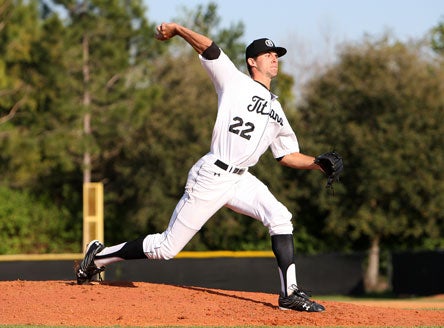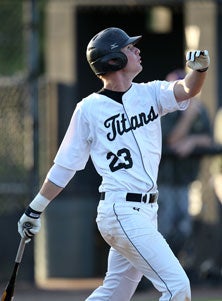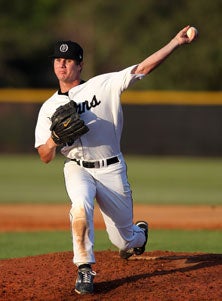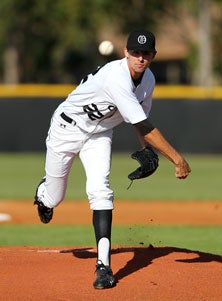
Walker Weickel totes an impressive resume with him every trip to the mound. He's got professional scouts drooling, international accolades and respect all around. What he doesn't have, however, is a Florida state title.
File photo by Mike Janes
They have so much in common,
Jesse Winker and
Walker Weickel. They're both amazing baseball players that attend
Olympia (Orlando, Fla.). They both had exceptional summers last year. They were the only high school teammates that represented Team USA's under-18 squad in Colombia that won the gold medal at the Junior Pan Am Championships.
They both pitch, though Winker is projected to be an outfielder at Florida, and Weickel a pitcher at Miami. They both take baseball very seriously, and they're both considered high-round picks in the June amateur draft. Their houses have been constantly visited by major league scouts, and their talent has crammed backstops with roving stopwatches and radar guns each time Olympia plays. They're also both versed in deflecting any talk or speculation of where they may go in the draft, nor giving any indication they may sign with a Major League team out of high school.

Jesse Winker also has pro potentialbut he's focused on a state title.
File photo by Mike Janes
Which leads to one other thing they have in common, something they might not be aware of even to themselves: They're restless. Winker and Weickel (sounds like a law firm) have succeeded at the national level, being selected among thousands to represent Team USA, and at the international level, winning the Junior Pan Am Championship. The one thing missing in their catalog of achievements is the local goal— a Florida state 8A championship.
Winker, who hit .509 with seven homers his junior year, and Weickel, who was 6-4 with a 2.94 ERA last year and a mid-90s fastball, have done everything
except that. Winning a state crown is the one promise they made to themselves before this season began.
"I'll be honest, I know the talk around me and Walker, and all the scouts at every game, but whatever happens four months from now, I'll concern myself with it then," said Winker, a 6-foot-3, 205-pound corner outfielder who throws left-handed. "My priority, my biggest concern is winning a state championship. I want to keep my approach at the plate correct and keep squaring up and keep showing my tools in the outfield. I want to show every team I'm prepared and ready to play, putting every ounce of what I have into every game and working toward a state title. I know Walker thinks the same way."
The 6-6, 205-pound Weickel doesn't need much prodding when it comes to the one void missing in his young baseball career.
"That's a no-brainer," Walker said. "We want to win a state championship. The Olympia High School baseball team has never won a state championship. It's been frustrating because we always had talent and very good players, but this year, everyone is expecting and hoping that's what will happen. We need to do something for the players from the past. Personally, I lived and grew up in this community, and it would be something special to leave high school and give the community a state championship. But it's a day-by-day approach. Each day that passes we want to get a little better mentally, physically and emotionally. I'm working on getting a little better each day, so I try not to focus on the draft or signing or anything like that. I don't want to get too ahead of myself."
For as much as they have in common, and their common goals, Winker and Weickel are also dissimilar in many ways, too.
Winker is a transplant from Buffalo, N.Y., where as a young child, he'd heave a wiffleball bat at a plastic ball and poke it over the family's roof into the front yard. Then he'd go run after it. Winker would continue this over and over for hours. A little kid in his little world, replaying games over in his head, each time playing the role of the hero. Each time never failing.

Winker also excels as a closer, buthe loves hitting much more.
File photo by Mike Janes
The genesis of Winker's love of baseball came in a contraption his father, Joe Sr., built: A 60-foot long boarded-up batting cage with the aged netting on top. It sits in Winker's backyard and serves as part baseball laboratory and part life lesson class. It's there sometimes until midnight when the blast of Jesse's bat, regardless of composition wood or metal, could be heard throughout the community. It's where Joe Sr. would impart wisdom and patience on the youngest of his three boys.
"It wasn't just hitting we spoke about, it was everything," Winker said. "My dad and I would play for hours in that backyard batting cage, because I always wanted to hit. My father is a hitting guru and he's self-taught; he's basically the black belt of hitting. I would hit with him for two to three hours in the cage. The batting cage is not just a place for baseball, it's things we talk about growing as a man."
He's definitely a proficient hitter, though Winker raised more than a few eyebrows with how he pitched in the Pan Am Championship. Winker was supposed to be the emergency left-handed closer available for spot duty. Because of a shortage of pitchers, Winker wound up pitching 11 2/3 innings of shutout baseball, giving up a mere three hits in earning Pitcher of the Tournament honors.
Could he have a future on the mound?
"Forget it, I really like hitting baseballs far and that's what I really want to do, playing every day," Winker said, laughing. "It's what I really enjoy. I'll close for Olympia, I like that, but playing every day at the high school level, at the college level, and possibly one day at the pro level, that's the goal."
With a work ethic that a rare few could rival, Winker is a machine. He'll work out and hit with Olympia after school. Go home, eat dinner, do homework (he carries a weighted 4.1 GPA at Olympia), hit some more at home, and then work out later at another hitting facility until 9 or 10 at night. Winker has great hands, with an ability to hit to the opposite field, and he has a great attitude. His maturity has enabled him to hit third for Titans coach Randy O'Neal since his sophomore year.
"Jesse makes everyone better in the lineup. Everyone ahead of him sees more fastballs and the best definition I'd put on Jesse is that he's a baseball player, through and through," said O'Neal, who is entering his sixth season and carries a 100-34 lifetime mark at Olympia. "Jesse started for me since his freshman year, and this is a tough place to play. What I really liked about Jesse is that he came here and competed right from the start. He never let anyone intimidate him. Jesse doesn't like to get beat in ping-pong, he hates to lose in anything.
"I knew Jesse since he was 11. He played for elite travel teams and showcase teams. You saw how Jesse interacted with the older kids. Seniors can give kids a hard time, especially freshmen, and I don't tolerate that. But Jesse was real good at blocking things out anyway. I played in the majors and I try to teach my kids to block things out and that facing adversity is a good thing. It's how you treat adversity that determines how good you are, and it's what makes Jesse and Walker kind of special. You don't get to the majors without that quality. Both these boys have it."
Another commonality between the two.
Whereas Winker is more gregarious and affable, Weickel is more on the reserved side, more cerebral, more open and humorous within a closed circle of trusted friends. Unlike Winker, too, Weickel is a native of Orlando. His father, Kevin, is a PGA tournament director and young Walker was as likely to have his tiny fingers wrapped around a golf club as a baseball bat growing up. Golf was the first sport Weickel was exposed to, but it was baseball that he eventually gravitated towards.

Weickel can choose between college at Miami or pro ball. But that choicecan wait until after the season.
File photo by Mike Janes
"I just kind of came up doing it all, golf, baseball, and I was taller than everyone my age, so I liked basketball, too," Weickel said. "There were really no expectations with any one sport over the other, but I'd say when I was around 12, baseball became more prominent. I guess I was at that age when I was old enough to understand the game and the purpose.
"It was a subliminal lean into baseball. I liked having the aspect of being a little unique with my size in baseball, too. I liked being outside and the team and individual strategy of the game. It was baseball and basketball up until high school, then the decision was made itself because I started to notice I was better in baseball. It came through in one of those natural ways of development. The more I was around baseball, the more I adapted to it and loved it that much more."
Weickel first hit 90 mph on the radar gun his sophomore year. But to him then, as it is now, it's always been about location and ball movement for his fastball, curveball and changeup. He's kinesthetically aware of his pitching form. He'll pore over video with his father of his pitching motion, and the mechanics of other prominent pitchers. Weickel has thrown plenty of phantom baseballs through the house, going over his pitching motion in the living room, kitchen, bedroom, anywhere he could stretch out his 6-6 frame in a slow, deliberate movement.
"My mental approach is something I stress. If I cannot handle and manage my own thoughts and my own emotions on the field, I won't have control of a 5-ounce baseball traveling 95 mph," said Walker, who carries a 3.9 GPA. "It all starts above the shoulders for me. Everyone is different in their development on the mental side. For me, it's kind of personal. I'll take some self-reflecting time after games. I'll know every pitch I threw.
"If I were to throw, hypothetically speaking, 60 pitches in a game, I might throw 10 to 20 pitches the exact way I wanted to throw them. The other 30 or 40, they may have been successful and the way I wanted to throw them, if I was able to get the hitter to react. That's what I'll go over. It's all about experience. I've gained so much more since last year. I don't think it's even comparable from my experience this year from this time last year. In the past, there were moments when I took myself out of games. Emotion took me out of logical thinking and that was reflected in my performance."
Three of Walker's four losses last year came from shoddy fielding behind him. Nothing Weickel did. But O'Neal has noticed a distinct change in Weickel from this year to last. He's been able to win with his Plan B stuff. That's an area O'Neal wanted his star pitcher to address.
"That started to change last year," O'Neal said. "One start last year, Walker wasn't having his best game. But this was also a game when we gave up five outs in one inning and it looked like we needed to play catch with peach baskets. I wanted to take him out, and Walker said he wanted to stay in the game.
"You can see where Walker is growing. Pitching is so much about confidence, and he really got that playing for USA Baseball. I've seen him at the top and I've seen him compete against the best hitters in the nation. He's just so dominant. When he's on, it's over. It's one of those things, when he's really on, it doesn't matter. The big thing with pitching is how well you can figure out a way to win when you don't have your best stuff. Walker is just figuring that out now, he's finding out ways to be a winner and blocking everything else out around him."
With Winker and Weickel leading the way, the Titans are already a marked team this spring. Olympia, which has been in existence for 10 years, went 18-7 in 2011 and lost in the first round of the District 5-A playoffs, 4-3, partly due to three errors. O'Neal schedules tough, and that won't change. Nor will the focus of Winker and Weickel.
As June fast approaches, and the scouts and cross-checkers mount behind the backstops at Olympia games, O'Neal will continue to stress the larger target is the state championship.
"Whatever Jesse and Walker do, it is a win-win for them," O'Neal said. "They're committed to two great schools, Florida and Miami. They're very intelligent kids from great families who will keep their hat sizes the same. If they go to school, they're going to be set and be great players. If a Major League team wants to draft them and try to buy their happiness, they're still going to be set and be great players. But it's going to take a big bag full of money to do it. Either way, Jesse and Walker are going to be fine. It's more important they go out as winners and get the school its first state championship in baseball than anything else right now."
Further cementing what Winker and Weickel could always share off the field — along with their uncommon ability on it.
